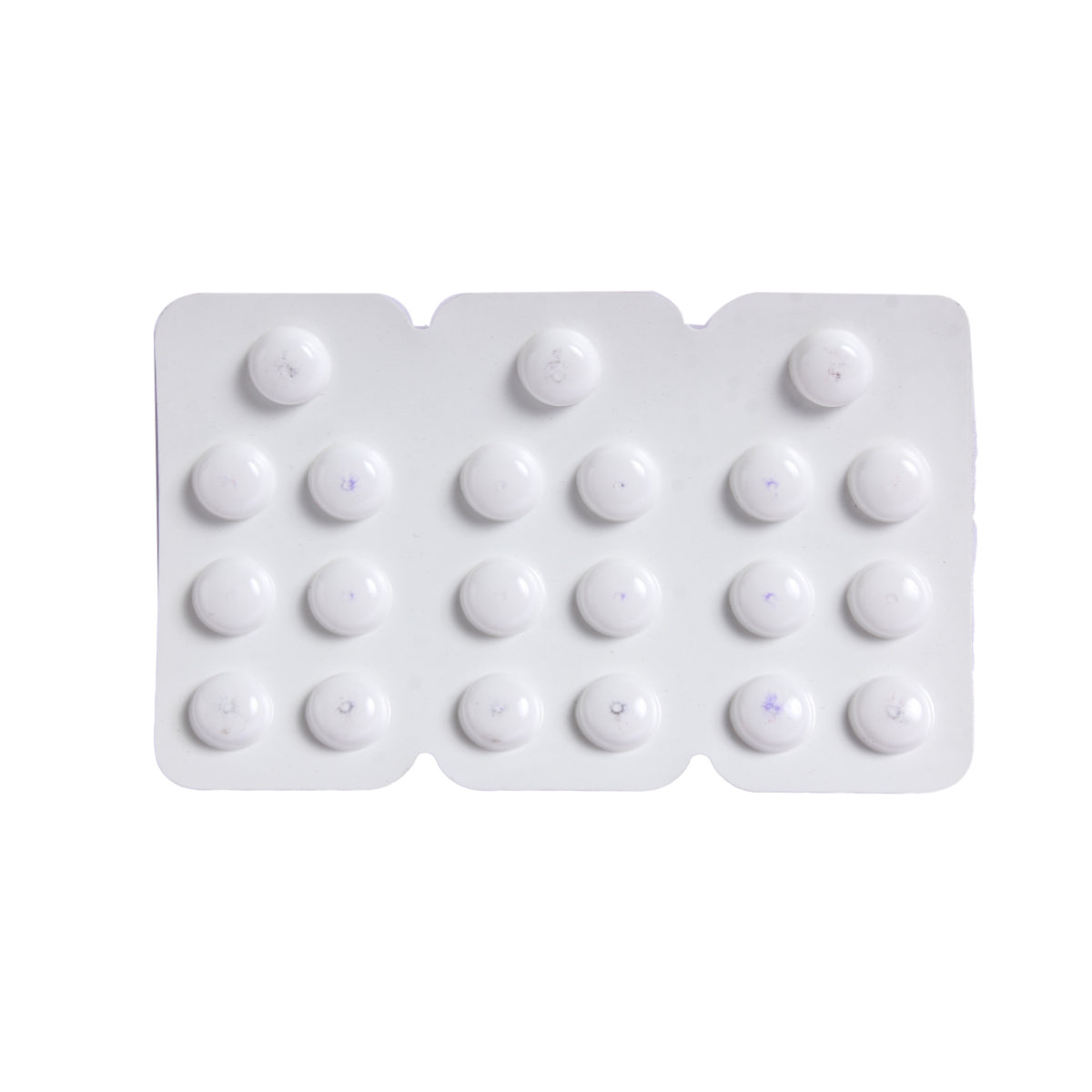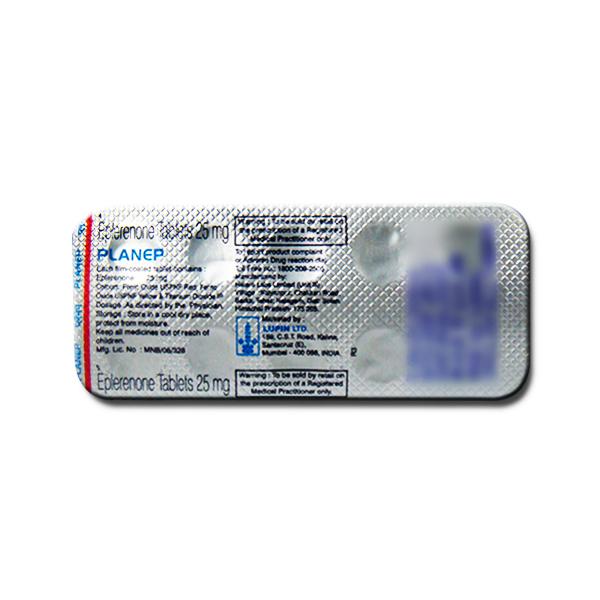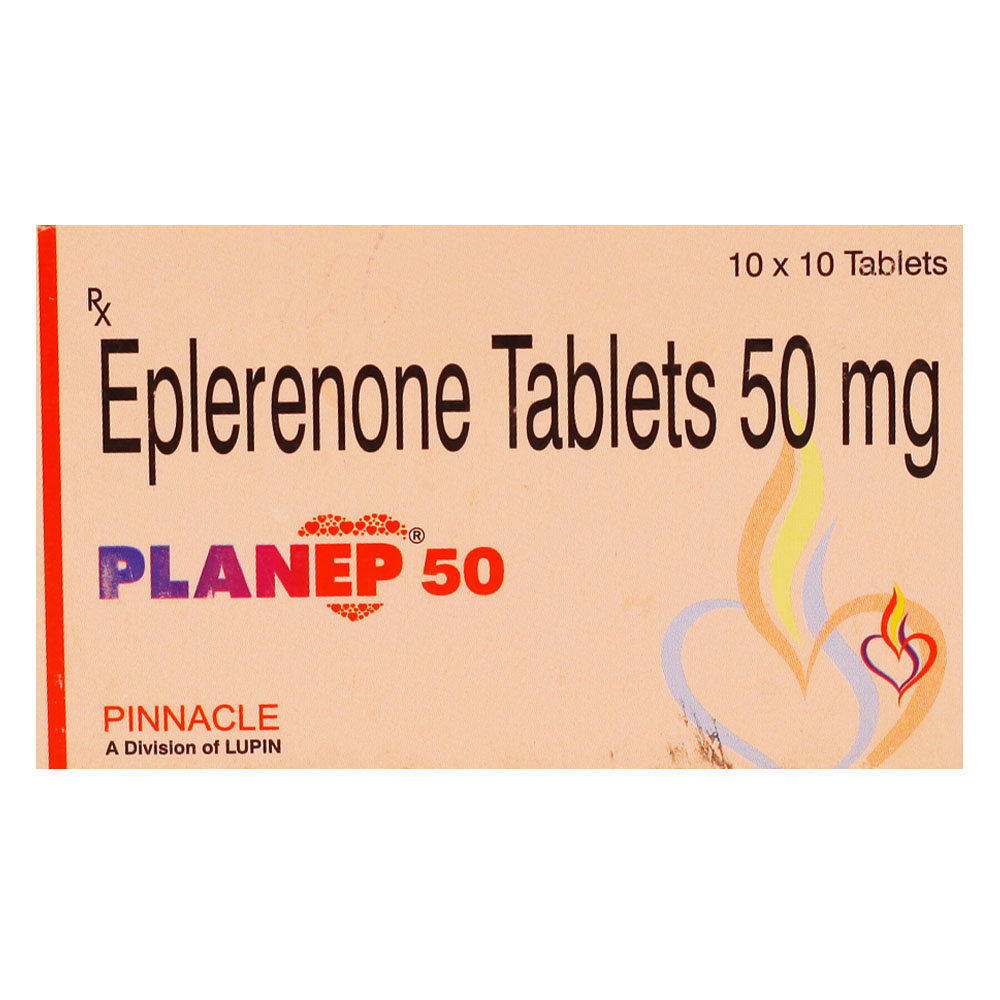Eplerenone
About Eplerenone
Eplerenone is used to treat your heart failure. It reduces the risk of death or the need for hospitalisation due to heart failure. Besides this, Eplerenone is also used to treat high blood pressure.
Eplerenone contains Eplerenone, which works by blocking the action of aldosterone, a natural substance that raises blood pressure. It also slows the progression of heart failure by reducing heart damage.
In some cases, Eplerenone may cause side effects like nausea, vomiting, dizziness, diarrhoea, and elevated potassium levels. Most of these side effects of Eplerenone do not require medical attention and resolve over time. However, if the side effects are persistent, reach out to your doctor.
Do not take Eplerenone if you are allergic to any of its components. Consult your doctor if you are pregnant or breastfeeding. Keep your doctor informed about your medical conditions and medicines to prevent any potential interactions.
Uses of Eplerenone
Medicinal Benefits
- Eplerenone contains Eplerenone, an aldosterone antagonist that helps improve heart function and control blood pressure.
- Eplerenone is beneficial for stable patients with left ventricular systolic dysfunction and congestive heart failure following an acute myocardial infarction (heart attack).
- It improves survival after a heart attack and helps reduce the risk of cardiovascular death and hospitalisation.
- Eplerenone is used in patients with mild but persistent heart failure symptoms, especially when previous treatments are insufficient.
- Eplerenone effectively lowers elevated blood pressure, which in turn reduces the risk of serious cardiovascular events such as stroke, heart attack (myocardial infarction), and heart failure.
- By blocking aldosterone (a hormone that can worsen heart failure and increase blood pressure), Eplerenone helps treat heart failure and high blood pressure.
Directions for Use
- Eplerenone can be taken with or without food.
- Follow your doctor's instructions regarding the dosage and duration for effective results.
- Swallow it as a whole with a glass of water.
- Do not crush, chew, or break it.
Storage
Side Effects of Eplerenone
- Elevated potassium levels
- Dizziness
- Nausea
- Vomiting
- Diarrhoea
- Fainting
- Headache
Drug Warnings
- Do not take Eplerenone if you are allergic to any of its components, have severe liver or kidney disease, or high levels of potassium.
- Inform your doctor if you have kidney or liver disease, fungal infection, depression, HIV infection, bacterial infection or if you are taking immunosuppressants, or lithium (used to treat manic disorders).
- Consult your doctor if you are pregnant or breastfeeding.
- Eplerenone is not recommended for children as the safety and effectiveness have not been established.
- Let your doctor know if you are taking any other medicines, including supplements and herbal products.
Drug Interactions
Drug-Drug Interactions: Eplerenone may interact with other high blood pressure-lowering pills (metoprolol, ramipril, hydrochlorothiazide), blood thinners (aspirin, warfarin), anti-epilepsy medicines (carbamazepine, phenobarbital), immune-suppressing drugs (cyclosporine), painkillers (ibuprofen), anti-fungal medicines (itraconazole, ketoconazole), HIV medicines (ritonavir, nelfinavir), anti-bacterial medicines (clarithromycin, telithromycin), anti-depressants (lithium).
Drug-Food Interactions: No interactions found.
Drug-Disease Interactions: Inform your doctor if you have low blood pressure (hypotension), coronary heart disease, liver or kidney disease, heart failure, high serum potassium (hyperkalemia), diabetes mellitus type 2 or anuria.
Drug-Drug Interactions Checker List:
Safety Advice

Alcohol
unsafeYou are recommended not to consume alcohol along with Eplerenone to avoid unpleasant side effects.

Pregnancy
cautionEplerenone should be used in pregnant women only if clinically needed, and the benefits outweigh the risks. Please consult your doctor if you are pregnant.

Breast Feeding
cautionPlease consult your doctor if you are breastfeeding. It should be used only if prescribed by a doctor and if the benefits outweigh the harms.

Driving
cautionEplerenone may cause dizziness. Dro not drive or operate machinery unless you are alert.

Liver
cautionEplerenone is not recommended for people with severe liver disease. Inform your doctor before starting Eplerenone if you have a history of liver diseases/conditions.

Kidney
cautionEplerenone is not recommended for people with severe kidney disease. Inform your doctor before starting Eplerenone if you have a history of kidney diseases/conditions.

Children
cautionEplerenone is not recommended for children below 12 years of age.
Habit Forming
Diet & Lifestyle Advise
- Consume antioxidant-rich foods such as blueberries, cherries, tomatoes, squash, and bell peppers.
- Use healthy cooking oils like soybean, olive, canola, and coconut oil.
- You should avoid refined foods such as white bread, spaghetti, sugar, and red meat.
- Reduce or eliminate trans fatty acids, which are found in commercially baked items such as cookies, cakes, crackers, French fries, onion rings, doughnuts, and processed foods.
- Avoid the consumption of too much salt or salty food.
- Maintain a healthy weight with a BMI of 19.5-24.9.
- Regular physical activity or exercise, like walking, improves your blood flow.
- Avoid standing or sitting for extended periods.
- Avoid chronic stress, as it can raise your blood pressure.
- Spend time with your loved ones to cope with stress and practice mindfulness techniques.
- Quitting smoking and alcohol consumption is the best strategy to lower the risk of many health complications.
Patients Concern
Disease/Condition Glossary
Heart failure: It is a chronic condition in which the heart cannot pump blood as effectively as it should. Heart failure may occur due to certain conditions like high blood pressure, swelling or damage to the heart muscle, faulty heart valves, or narrow arteries in the heart. Symptoms of heart failure include shortness of breath, tiredness, fast heartbeat, and swollen legs.
Hypertension: When blood pressure rises, too much force is exerted on the lining of the arteries, causing the heart to work harder to pump blood throughout the body. This results in damage to the blood vessels. If high blood pressure is left untreated, it can lead to stroke, heart attack, heart failure, kidney failure, and eye problems.
FAQs
Eplerenone is used to treat heart failure and hypertension (high blood pressure).
Eplerenone contains Eplerenone, which works by blocking the action of aldosterone, a natural substance that raises blood pressure. It also slows the progression of heart failure by reducing heart damage.
Yes, Eplerenone can cause increased potassium levels (hyperkalemia), especially in patients with kidney problems or if you are taking potassium supplements along with Eplerenone. Please monitor your electrolyte level regularly to avoid increased blood potassium levels. Consult your doctor if you experience muscle cramps, diarrhoea, nausea, dizziness or headache.
No, Eplerenone is not a blood thinner. It is a selective aldosterone blocker used to treat heart failure and high blood pressure.
Eplerenone contains Eplerenone. It is an aldosterone antagonist type of potassium-sparing diuretic.
Eplerenone may take up to 4 weeks to show its full effect. Keep taking Eplerenone for the prescribed duration.
No, Eplerenone is not known to cause erectile dysfunction. It does not have any effect on fertility.
Do not discontinue Eplerenone without consulting the doctor. To treat your condition effectively, keep taking Eplerenone for the prescribed duration.
Potassium-sparing diuretics increase urine production without depleting potassium reserves. Eplerenone permits the body to lose sodium while retaining potassium. The amount of potassium may rise as a result. Therefore, your doctor may regularly check your potassium levels.
Your doctor might have recommended Eplerenone instead of Losartan as a blood pressure medication because losartan may have been insufficient in lowering your blood pressure. However, Eplerenone increases the risk of elevated potassium levels, which may not be suitable for you. Hence, the doctor has prescribed Eplerenone along with hydrochlorothiazide to prevent the rise in potassium levels.
Before starting Eplerenone, let the doctor know if you are taking aspirin. Taking aspirin with Eplerenone may decrease the effects of Eplerenone. Contact your doctor if you experience signs of high blood pressure such as headache, blurred vision, trouble concentrating, or dizziness.
Eplerenone may cause side effects like nausea, vomiting, dizziness, diarrhoea, and elevated potassium levels. Most of these side effects of Eplerenone do not require medical attention and resolve over time. However, if the side effects are persistent, reach out to your doctor.








